

The Most Disturbing Part Of The JPMorgan News Is That It's Not Shocking At All. Americans’ Debt Hangover Seen Ending in Boost to Growth. Suffering from a debt hangover for the past four years, Americans will resort to a time-honored cure -- hair of the dog that bit them.
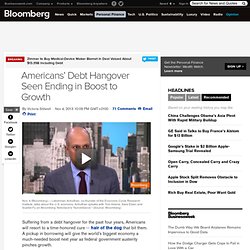
A pickup in borrowing will give the world’s biggest economy a much-needed boost next year as federal government austerity pinches growth. Workers will be more willing to take out loans as the lowest unemployment rate in almost five years bolsters job security, while banks will be more likely to lend after cleaning up their own balance sheets. Why Small Business Lending Isn’t What It Used to Be. Why Small Business Lending Isn’t What It Used to Be Ann Marie Wiersch and Scott ShaneCleveland Fed Since the Great Recession, bank lending to small businesses has fallen significantly, and policymakers have become concerned that these businesses are not getting the credit they need.
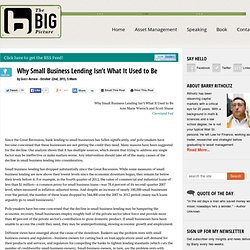
Many reasons have been suggested for the decline. Our analysis shows that it has multiple sources, which means that trying to address any single factor may be ineffective or make matters worse. How Many ‘Greater Fools’ Does It Take to Make a Bubble? - MoneyBeat. 5 Years After Financial Crisis, Big Banks Are Still Committing Crimes. Regulators Should Draw a Line Between Finance and Commerce - MoneyBeat. My Lehman lesson: Model diversification and flexibility. The press and the blogosphere has been full of articles about the five year anniversary of the Lehman Crisis.
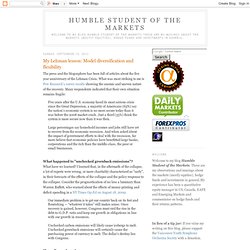
What was most striking to me is Pew Research's survey results showing the anemic and uneven nature of the recovery. Many respondents indicated that their own situation remains fragile: Five years after the U.S. economy faced its most serious crisis since the Great Depression, a majority of Americans (63%) say the nation’s economic system is no more secure today than it was before the 2008 market crash.
Just a third (33%) think the system is more secure now than it was then.Large percentages say household incomes and jobs still have yet to recover from the economic recession. And when asked about the impact of government efforts to deal with the recession, far more believe that economic policies have benefitted large banks, corporations and the rich than the middle-class, the poor or small businesses. Banks Really Are Different Five Years After the Financial Crisis.
On his way to Afghanistan, an officer is surprised by a strange sight at a layover in the middle of the night.
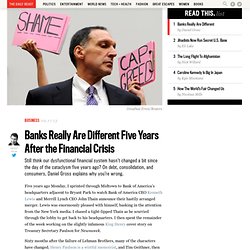
Editor’s Note: Nick Willard is the pen name of a service member serving in Afghanistan during the closing days of America’s longest war. He will write what he sees in an ongoing feature for The Daily Beast. Biographical details have been changed to protect his identity. I told my kids goodbye as they went to bed the night before I left. Banks Push Back Against Swap Rules. Swap Rules of Limited Reach. How the Bank Lobby Loosened U.S. Reins on Derivatives. One by one, Gary Gensler’s supporters deserted him.
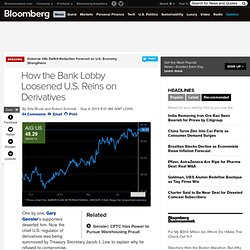
Now the chief U.S. regulator of derivatives was being summoned by Treasury Secretary Jacob J. How the Bank Lobby Loosened U.S. Reins on Derivatives. How the Bank Lobby Loosened U.S. Reins on Derivatives. Popping the "Bubble" Bubble. Without a doubt, QE has been an incredible boon for financial markets.
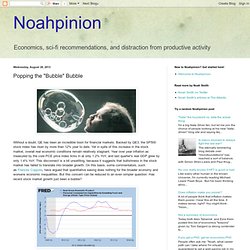
Backed by QE3, the SP500 stock index has risen by more than 12% year to date. Yet in spite of this increase in the stock market, overall real economic conditions remain relatively stagnant. Year over year inflation as measured by the core PCE price index ticks in at only 1.2% YoY, and last quarter's real GDP grew by only 1.4% YoY. This disconnect is a bit unsettling, because it suggests that bullishness in the stock market has failed to translate into broader growth. On this basis, some commentators, such as Frances Coppola, have argued that quantitative easing does nothing for the broader economy and worsens economic inequalities. Bill Frezza: Too-Big-To-Fail Banks Gamble With Bernanke Bucks. As Congress and the President wallow in finger pointing and fiscal gridlock, Federal Reserve Chairman Ben Bernanke plows ahead with his plan to disguise the country's economic ills by carpet-bombing us with freshly printed money.
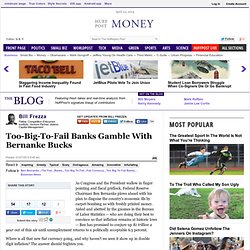
Aided and abetted by the gnomes in the Bureau of Labor Statistics -- who are doing their best to convince us that inflation remains at historic lows -- Ben has promised to conjure up $1 trillion a year out of thin air until unemployment returns to a politically acceptable 6.5 percent. Where is all that new fiat currency going, and why haven't we seen it show up in double digit inflation? The answer should frighten you. Collateral Damage: QE3 and the Shadow Banking System. Rather than expanding the money supply, quantitative easing (QE) has actually caused it to shrink by sucking up the collateral needed by the shadow banking system to create credit.
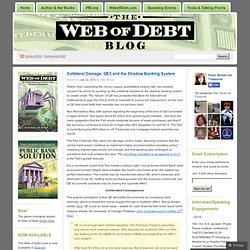
The “failure” of QE has prompted the Bank for International Settlements to urge the Fed to shirk its mandate to pursue full employment, but the sort of QE that could fulfill that mandate has not yet been tried. Ben Bernanke’s May 29th speech signaling the beginning of the end of QE3 provoked a “taper tantrum” that wiped about $3 trillion from global equity markets – this from the mere suggestion that the Fed would moderate its pace of asset purchases, and that if the economy continues to improve, it might stop QE3 altogether by mid-2014.
The Fed is currently buying $85 billion in US Treasuries and mortgage-backed securities per month. Unintended Consequences The popular perception is that QE stimulates the economy by increasing bank reserves, which increase the money supply through a multiplier effect. The Leveraged Buyout of America. In a letter to Federal Reserve Chairman Ben Bernanke dated June 27, 2013, US Representative Alan Grayson and three co-signers expressed concern about the expansion of large banks into what have traditionally been non-financial commercial spheres.
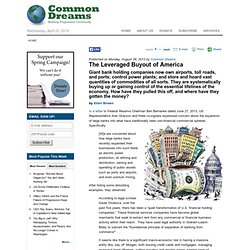
Specifically: [W]e are concerned about how large banks have recently expanded their businesses into such fields as electric power production, oil refining and distribution, owning and operating of public assets such as ports and airports, and even uranium mining. After listing some disturbing examples, they observed: According to legal scholar Saule Omarova, over the past five years, there has been a “quiet transformation of U.S. financial holding companies.” These financial services companies have become global merchants that seek to extract rent from any commercial or financial business activity within their reach.
Stiglitz: 6 Lessons of the Credit Crisis. Stiglitz: 6 Lessons of the U.S.
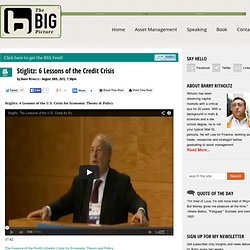
Crisis for Economic Theory & Policy The Lessons of the North Atlantic Crisis for Economic Theory and Policy “When a bank extends a loan, it creates a deposit account, increasing the supply of money.” Towards a New Paradigm in Monetary Economics (2003) Ripping Off Young America: The College-Loan Scandal. On May 31st, president Barack Obama strolled into the bright sunlight of the Rose Garden, covered from head to toe in the slime and ooze of the Benghazi and IRS scandals. In a Karl Rove-ian masterstroke, he simply pretended they weren't there and changed the subject. The topic? Student loans. Unless Congress took action soon, he warned, the relatively low 3.4 percent interest rates on key federal student loans would double. Ex-JPMorgan Bankers Charged by U.S. in $6.2 Billion Loss. Two former JPMorgan Chase & Co. (JPM) employees were charged by federal prosecutors with attempting to conceal trading losses at the largest U.S. bank last year as part of a probe of its $6.2 billion loss on derivatives bets.
Javier Martin-Artajo, who oversaw trading strategy for the synthetic portfolio at the bank’s chief investment office in London, and Julien Grout, a trader who worked for him, were charged with conspiracy, wire fraud and false filings in complaints unsealed today in Manhattan federal court. The two men engaged in a scheme to falsify securities filings between March and May of 2012, the government said. Next Fed Head Should Meet the Bernie Sanders/Elizabeth Warren Standard.
Share Consumer Financial Protection Bureau Advisor Elizabeth Warren speaks at the Reuters Future Face of Finance Summit in Washington, March 1, 2011. (REUTERS/Kevin Lamarque) No presidential appointment, no Senate confirmation, matters more than the one that will soon come for the post of chairman of the Federal Reserve.
If ever there was a time to ask for more—and better—this is it. Yet, for the most part, official Washington is on autopilot, preparing for the replacement of outgoing Federal Reserve chairman Ben Bernanke with another predictable insider—perhaps even the ultimate predictable insider: former Treasury Secretary Larry Summers. Summers Fed chair: His failed tenure at Harvard should give us pause about his friends’ reassurances. Photo by Feng Li/Getty Images The debate over who should succeed Ben Bernanke as chairman of the Federal Reserve has exposed a number of divides within the Democratic Party: Men versus women in a party that gets the majority of its votes from women, but whose economic policy barons are mostly men; hawks versus doves on monetary policy; enthusiastic bank regulators versus more cautious ones.
Someone stop Larry Summers from bagging the Fed before it’s too late. The Financial Crisis Cost More Than $14 Trillion: Dallas Fed Study. The financial crisis likely cost at least a year's worth of U.S. economic output, a new Fed study finds. Obama Said to Consider Raskin for No. 2 Treasury Post. President Barack Obama is considering Federal Reserve Governor Sarah Bloom Raskin, a former state banking regulator, to serve as deputy Treasury Secretary, according to two people familiar with the matter. Fears Rise That Larry Summers Is Likely To Be Named Fed Chairman. WASHINGTON -- President Barack Obama is leaning towards former White House Economic Adviser Larry Summers as his choice to replace Ben Bernanke as chairman of the Federal Reserve, according to people who have been briefed on the administration's thinking.
Liberal critics of Summers' economic record, along with those who continue to question his ability to work with women, are waging a last-minute campaign to persuade the president to change his mind and instead choose the other frontrunner for the job, Fed Vice Chair Janet Yellen. Fed Reviews Rule on Big Banks’ Commodity Trades After Complaints.
Calculated Risk. The Big Backlash. C:New York Stock Quote - Citigroup Inc. Citigroup Profit Beats Estimates as Stock Trading Gains. Citigroup Inc. (C), the third-biggest U.S. bank by assets, posted a 42 percent increase in second-quarter profit that beat analysts’ estimates as stock-trading revenue surged and losses on unwanted assets declined. Finance set to surpass tech as most-profitable U.S. industry. SEC Takes Former Goldman Sachs Trader 'Fabulous Fab' To Trial In Civil Fraud Case. Minsky. He Foresaw the End of an Era by John Cassidy. The New Paradigm for Financial Markets: The Credit Crisis of 2008 and What It Means by George Soros. JPMorgan Chase Fires Back At Warren-McCain Plan To Reinstate Glass-Steagall.
Why John Maynard Keynes Supported the New Deal. Don't Invest in Hedge Funds - Business. Hedge Funds Are for Suckers. Investors Can Run, but They Can’t Hide - MoneyBeat. Chairman of the US Federal Reserve - US Federal Reserve Betting. The Return of Glass Steagall ? Two Sentences that Explain the Crisis and How Easy it Was to Avoid. Don't Invest in Hedge Funds - Business.